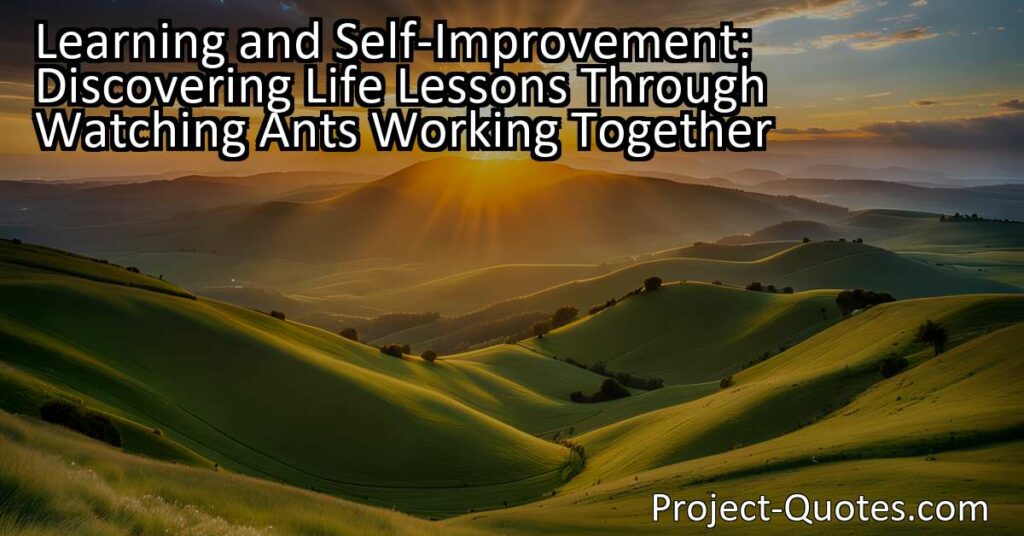Let God and all his creation teach you what your sins are.
Johannes Tauler
Learning and Self-Improvement: Discovering Life Lessons Through Watching Ants Working Together Have you ever watched ants working together? They can teach us about teamwork and unselfishness. By observing nature and reflecting on our actions, we can learn valuable life lessons that help us become better individuals.
Table of Contents
Meaning of Quote – Let God and all his creation teach you what your sins are.
Johannes Tauler, a German mystic and preacher from the 14th century, once said, “Let God and all his creation teach you what your sins are.” Although it might sound a bit serious at first, what Tauler is suggesting here is actually a really interesting idea about learning and self-improvement through reflecting on the world around us.
Imagine you’re sitting in your backyard, the breeze is gentle, the sun is warm, and you’re watching this little dance of nature around youbirds chirping, squirrels hopping from branch to branch, and maybe a butterfly fluttering by. Nature is often seen as a big, beautiful classroom where we can learn a lot about the world and about ourselves. Now, Tauler’s idea fits right into this picture, but it asks us to do a little more than just enjoy the scenery.
So what does he mean by “Let God and all his creation teach you what your sins are?” Well, ‘sins’ is a word that often makes people think of rules being broken, but it doesn’t only have to mean that. It can also mean the mistakes we make, the things we do that maybe aren’t so great for others or for ourselves. Tauler might be suggesting that by paying close attention to nature and considering what higher powers or our own conscience expect of us, we can figure out where we’re going wrong and how we can be better.
Let’s take a closer look at how this might work. For instance, have you ever watched ants working together? They’re really good at it! They communicate and cooperate to build things, find food, and protect their home. Watching them could teach us about the importance of teamwork and the times when we’ve been a bit selfish or haven’t helped others as much as we could have.
Then there’s the way we treat our environment. You know how you feel when you see someone littering in that beautiful park you love to play in? It just feels wrong, right? That’s because, deep down, we know we all share this planet and it’s up to us to take care of it. When we don’t, it’s kind of like a wakeup call to remember that respect for our Earth is a big dealand forgetting that can be a ‘sin’ or mistake, too.
Tauler lived a long time ago when things were really different, but people back then looked at the world and saw lessons just like we do today. They used those lessons to think about what they were doing with their lives. They believed that the world was created by God and that everything in it was a way for God to speak to them, to show them how to live good lives and fix their mistakes.
For example, have you ever felt the calmness of a quiet, starry night and noticed how it makes you feel peaceful? Or maybe you’ve watched how patiently a spider weaves its web, and it made you think about how you could be more patient with your little brother or sister? These experiences might seem small, but they’re like nature’s way of nudging us to think about the big stuff, like how we treat people and how we handle our emotions.
Now, you don’t have to believe in the same things that Tauler did to get something out of his idea. Whether you believe in God, nature, or something else, the message is about learning from what’s around you. It’s about recognizing that there are ways we can do better every day, and the world offers clues on how to do that.
It could be about honesty, too. When you see how clear and uncomplicated life is for animalsthey don’t hide their feelings or pretend to be something they’re notit might remind us of times we weren’t totally honest or when we tried to be someone we’re not just to fit in. Observing this straightforwardness in nature could inspire us to live more authentically.
Another part of Tauler’s idea might be about finding stillness and listening. In the hustle and bustle of everyday life, we can get so busy that we forget to stop and think about what we’re doing and why we’re doing it. But when you sit quietly and listen to the world, whether it’s to the wind, the waves, or even the quiet heartbeat of the earth, it can help you hear your own thoughts more clearly. And in those thoughts, sometimes, you can find answers to questions like, “Am I doing the right thing?” or “Could I have been kinder in that situation?”
When Tauler was talking about letting God and creation teach us about our sins, he was encouraging us to have a sense of awareness. It’s about being open to recognizing when we mess up and using that knowledge to grow. No one’s perfectwe all have our moments we’re not proud of. But the point is not to beat ourselves up about it. The point is to learn, to be better, and to move forward with a kind heart and a clearer mind.
In the end, Tauler’s wisdom invites us to look at the world as both a beautiful place to explore and a source of life lessons. It’s like having the best kind of teacherone that doesn’t use a chalkboard but uses the sky, the trees, the animals, and even the weather to show you how to be the best you can be. It’s about taking those little nuggets of truth and wisdom from what we see, hear, and experience every day and using them to reflect on our actions and choices, guiding us towards a more positive path for ourselves and those around us.
I hope this quote inspired image brings you hope and peace. Share it with someone who needs it today!


